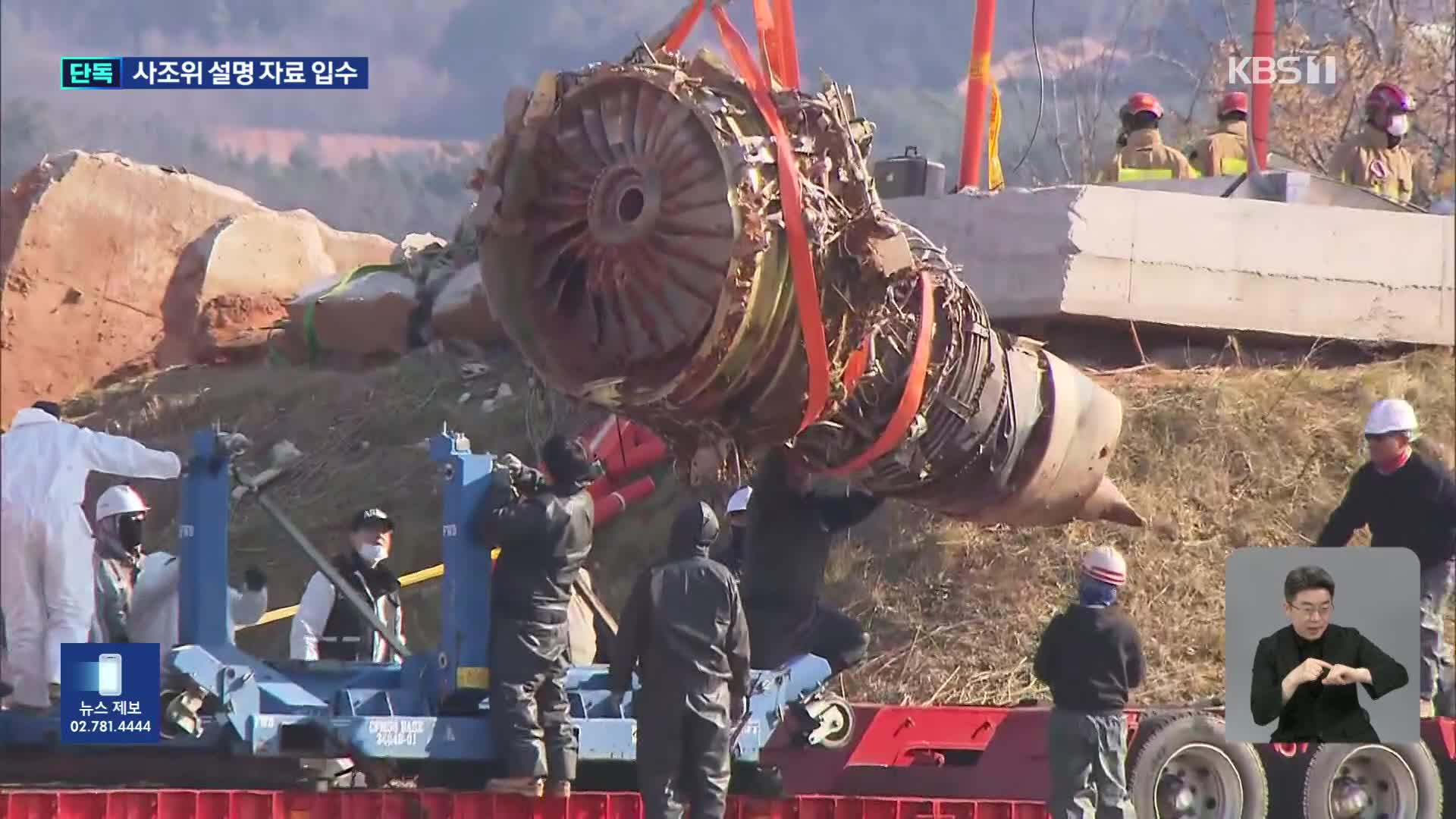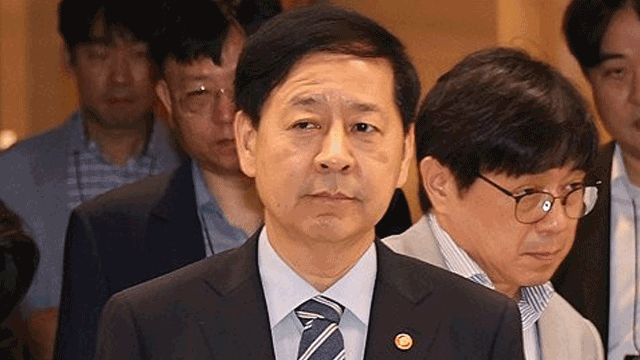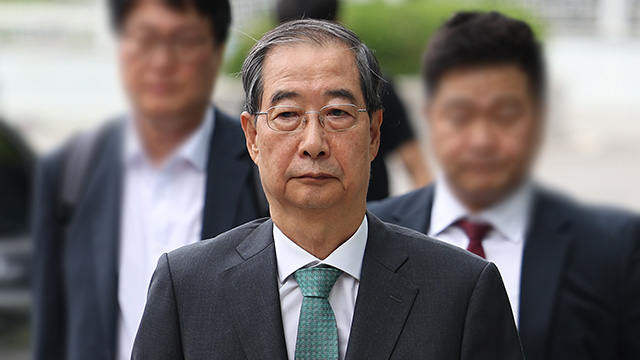[Anchor]
Our reporting team has obtained undisclosed explanatory materials from the investigation committee regarding the Jeju Air passenger plane accident.
Upon thorough examination, it has been determined that the left engine, which was said to be less damaged, may also have sustained serious damage.
Reporter Yoon Ah-rim has the exclusive report.
[Report]
After confirming the flock of birds, the accident aircraft began its go-around and collided with the birds 4 to 5 seconds later.
This is the go-around point first disclosed by the investigation committee.
Nineteen seconds after the bird strike, the left engine shut down, and the committee explained that the pilot confirmed the left engine had stopped while performing emergency procedures for the right engine.
They also indicated that they are analyzing human factors, suggesting the possibility of pilot error.
The committee also provided explanations regarding the condition of both engines.
Immediately after the bird strike, there was vibration in both engines, and there was a surge phenomenon, including flames and explosions, from the right engine.
There were also testimonies from surviving crew members.
However, it was revealed that there was also a surge phenomenon in the left engine, which was said to be less damaged.
It was confirmed that the combustion chamber pressure dropped before the flight data recorder (FDR) turned off.
The possibility of serious damage to the left engine cannot be ruled out, but the committee did not disclose any records that could serve as the basis for their judgment.
The committee also cited "sound spectrum" analysis as the basis for determining that the output of the right engine was at a flyable level just before landing.
They stated that they confirmed the engine output by analyzing the engine sounds with French investigative authorities.
[Kim Jae-pyeong/Professor, Department of Broadcasting and Sound Technology, Daelim University: "If a foreign object got stuck or if there was an external impact, the (sound) spectrum would change. To ensure reliability, it would be helpful to have a reference on how the RPM changes according to the spectrum..."]
[Jeon Seung-jun/Professor, Department of Aviation Operations, Cheongju University: "The occurrence of a surge indicates that there is an abnormal sound, and measuring the RPM of a damaged engine is inappropriate."]
However, the committee did not disclose data on exactly how the sound spectrum analysis was conducted or what the output level was.
This is KBS News, Yoon Ah-rim.
Our reporting team has obtained undisclosed explanatory materials from the investigation committee regarding the Jeju Air passenger plane accident.
Upon thorough examination, it has been determined that the left engine, which was said to be less damaged, may also have sustained serious damage.
Reporter Yoon Ah-rim has the exclusive report.
[Report]
After confirming the flock of birds, the accident aircraft began its go-around and collided with the birds 4 to 5 seconds later.
This is the go-around point first disclosed by the investigation committee.
Nineteen seconds after the bird strike, the left engine shut down, and the committee explained that the pilot confirmed the left engine had stopped while performing emergency procedures for the right engine.
They also indicated that they are analyzing human factors, suggesting the possibility of pilot error.
The committee also provided explanations regarding the condition of both engines.
Immediately after the bird strike, there was vibration in both engines, and there was a surge phenomenon, including flames and explosions, from the right engine.
There were also testimonies from surviving crew members.
However, it was revealed that there was also a surge phenomenon in the left engine, which was said to be less damaged.
It was confirmed that the combustion chamber pressure dropped before the flight data recorder (FDR) turned off.
The possibility of serious damage to the left engine cannot be ruled out, but the committee did not disclose any records that could serve as the basis for their judgment.
The committee also cited "sound spectrum" analysis as the basis for determining that the output of the right engine was at a flyable level just before landing.
They stated that they confirmed the engine output by analyzing the engine sounds with French investigative authorities.
[Kim Jae-pyeong/Professor, Department of Broadcasting and Sound Technology, Daelim University: "If a foreign object got stuck or if there was an external impact, the (sound) spectrum would change. To ensure reliability, it would be helpful to have a reference on how the RPM changes according to the spectrum..."]
[Jeon Seung-jun/Professor, Department of Aviation Operations, Cheongju University: "The occurrence of a surge indicates that there is an abnormal sound, and measuring the RPM of a damaged engine is inappropriate."]
However, the committee did not disclose data on exactly how the sound spectrum analysis was conducted or what the output level was.
This is KBS News, Yoon Ah-rim.
■ 제보하기
▷ 카카오톡 : 'KBS제보' 검색, 채널 추가
▷ 전화 : 02-781-1234, 4444
▷ 이메일 : kbs1234@kbs.co.kr
▷ 유튜브, 네이버, 카카오에서도 KBS뉴스를 구독해주세요!
- [Exclusive] Jeju Air left engine
-
- 입력 2025-07-23 23:45:51

[Anchor]
Our reporting team has obtained undisclosed explanatory materials from the investigation committee regarding the Jeju Air passenger plane accident.
Upon thorough examination, it has been determined that the left engine, which was said to be less damaged, may also have sustained serious damage.
Reporter Yoon Ah-rim has the exclusive report.
[Report]
After confirming the flock of birds, the accident aircraft began its go-around and collided with the birds 4 to 5 seconds later.
This is the go-around point first disclosed by the investigation committee.
Nineteen seconds after the bird strike, the left engine shut down, and the committee explained that the pilot confirmed the left engine had stopped while performing emergency procedures for the right engine.
They also indicated that they are analyzing human factors, suggesting the possibility of pilot error.
The committee also provided explanations regarding the condition of both engines.
Immediately after the bird strike, there was vibration in both engines, and there was a surge phenomenon, including flames and explosions, from the right engine.
There were also testimonies from surviving crew members.
However, it was revealed that there was also a surge phenomenon in the left engine, which was said to be less damaged.
It was confirmed that the combustion chamber pressure dropped before the flight data recorder (FDR) turned off.
The possibility of serious damage to the left engine cannot be ruled out, but the committee did not disclose any records that could serve as the basis for their judgment.
The committee also cited "sound spectrum" analysis as the basis for determining that the output of the right engine was at a flyable level just before landing.
They stated that they confirmed the engine output by analyzing the engine sounds with French investigative authorities.
[Kim Jae-pyeong/Professor, Department of Broadcasting and Sound Technology, Daelim University: "If a foreign object got stuck or if there was an external impact, the (sound) spectrum would change. To ensure reliability, it would be helpful to have a reference on how the RPM changes according to the spectrum..."]
[Jeon Seung-jun/Professor, Department of Aviation Operations, Cheongju University: "The occurrence of a surge indicates that there is an abnormal sound, and measuring the RPM of a damaged engine is inappropriate."]
However, the committee did not disclose data on exactly how the sound spectrum analysis was conducted or what the output level was.
This is KBS News, Yoon Ah-rim.
Our reporting team has obtained undisclosed explanatory materials from the investigation committee regarding the Jeju Air passenger plane accident.
Upon thorough examination, it has been determined that the left engine, which was said to be less damaged, may also have sustained serious damage.
Reporter Yoon Ah-rim has the exclusive report.
[Report]
After confirming the flock of birds, the accident aircraft began its go-around and collided with the birds 4 to 5 seconds later.
This is the go-around point first disclosed by the investigation committee.
Nineteen seconds after the bird strike, the left engine shut down, and the committee explained that the pilot confirmed the left engine had stopped while performing emergency procedures for the right engine.
They also indicated that they are analyzing human factors, suggesting the possibility of pilot error.
The committee also provided explanations regarding the condition of both engines.
Immediately after the bird strike, there was vibration in both engines, and there was a surge phenomenon, including flames and explosions, from the right engine.
There were also testimonies from surviving crew members.
However, it was revealed that there was also a surge phenomenon in the left engine, which was said to be less damaged.
It was confirmed that the combustion chamber pressure dropped before the flight data recorder (FDR) turned off.
The possibility of serious damage to the left engine cannot be ruled out, but the committee did not disclose any records that could serve as the basis for their judgment.
The committee also cited "sound spectrum" analysis as the basis for determining that the output of the right engine was at a flyable level just before landing.
They stated that they confirmed the engine output by analyzing the engine sounds with French investigative authorities.
[Kim Jae-pyeong/Professor, Department of Broadcasting and Sound Technology, Daelim University: "If a foreign object got stuck or if there was an external impact, the (sound) spectrum would change. To ensure reliability, it would be helpful to have a reference on how the RPM changes according to the spectrum..."]
[Jeon Seung-jun/Professor, Department of Aviation Operations, Cheongju University: "The occurrence of a surge indicates that there is an abnormal sound, and measuring the RPM of a damaged engine is inappropriate."]
However, the committee did not disclose data on exactly how the sound spectrum analysis was conducted or what the output level was.
This is KBS News, Yoon Ah-rim.
-
-

윤아림 기자 aha@kbs.co.kr
윤아림 기자의 기사 모음
-
이 기사가 좋으셨다면
-
좋아요
0
-
응원해요
0
-
후속 원해요
0















이 기사에 대한 의견을 남겨주세요.